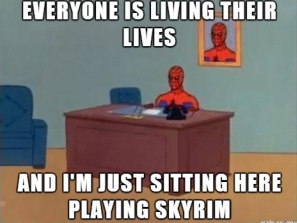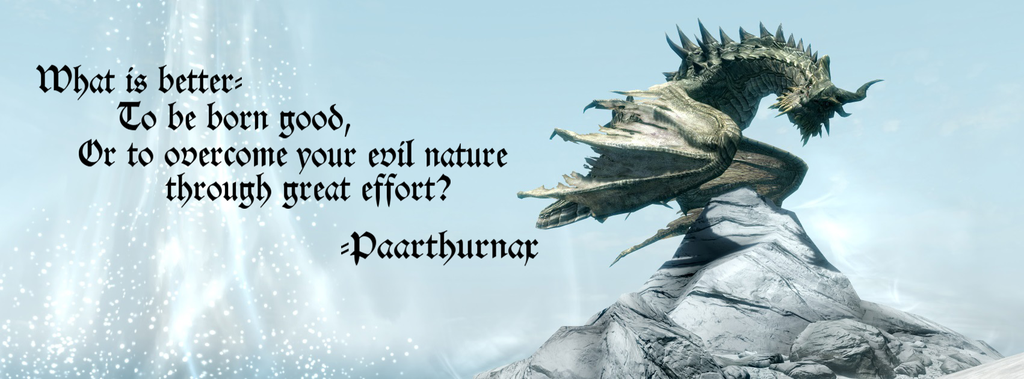Videogames and Depression
This is another repost from my WordPress days, back when I was playing a lot of Skyrim.
 I have battled with clinical depression for most of my adult life. The primary reason that I have maintained a weblog in one form or another is that writing is one of the ways that I deal with my depression. I also play video games. Writing and exercise are positive things that help me to feel productive. Video games are a tricky balance. In moderation, gaming helps me vent frustrations, much like exercise does. If I am not careful, however, gaming can go off the rails, and become basically the only thing that I do, outside of the bare essentials like not getting fired from work and keeping the children alive.
I have battled with clinical depression for most of my adult life. The primary reason that I have maintained a weblog in one form or another is that writing is one of the ways that I deal with my depression. I also play video games. Writing and exercise are positive things that help me to feel productive. Video games are a tricky balance. In moderation, gaming helps me vent frustrations, much like exercise does. If I am not careful, however, gaming can go off the rails, and become basically the only thing that I do, outside of the bare essentials like not getting fired from work and keeping the children alive.
About 12 years ago I was working this horrible job as a help desk agent, taking borderline abusive tech support calls from cognitively-impaired corporate lusers. I was completely miserable, and when I started playing Asheron’s Call, I slipped into full-blown video game addiction. My work day consisted of working on auto-pilot while surfing Maggie the Jackcat’s website for quests to run and items to craft. I would then stay up all night running various toons through said quests, and crafting said items. I even wrote a blog chronicling my adventures. It was pathetic :-) Then suddenly, I burned out on AC and when I stopped playing, I suddenly realized how miserable I was at work, and invested my energy into finding a new job.
A few years later, I got into City of Heroes pretty seriously. I was especially into multi-boxing and at one point, I was running 8 toons at once. Multiboxing turned my altaholism into a superpower. While I logged many hours playing CoH, it was not nearly as life-consuming as AC.
Today, my drug of choice is Skyrim. In many ways it’s less compelling than an MMO, but the story has caused me to have more than a few spiritual and philosophical reflections. One idea in particular is the attitude of many NPCs that the prophecy of the return of the dragons makes the end of the world a foregone conclusion. In the context of the game, if you are going to affect change, you are fighting not only dragons and undead, you are also fighting a culture of apocalyptic pessimism. As a parable for combating depression, I can’t think of a better interactive story.
